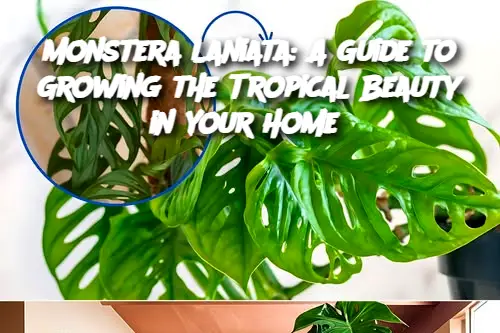ADVERTISEMENT
Displaying Your Monstera Laniata: Place your Monstera laniata on a stand, a shelf, or near a windowsill to showcase its lush foliage. A hanging planter also works great for this vine-like plant. Rotate the plant occasionally for even growth on all sides.
Re-potting: Re-pot your Monstera every couple of years or when you notice the roots becoming crowded. This gives the plant more space to grow and ensures its roots stay healthy.
Cleaning: Dust off the large leaves using a damp cloth to allow the plant to breathe better and absorb more sunlight. This also helps to prevent pests and diseases.
Variants:
While Monstera laniata is a beautiful plant on its own, there are several different species and varieties of Monstera plants that you may also want to consider adding to your indoor garden. These include:
Monstera Deliciosa: Known for its large, hole-punched leaves.
Monstera Borsigiana: A slightly smaller variety with similar leaf shapes.
Monstera Adansonii: A more delicate variety with fenestrated (holey) leaves that thrive indoors.
These variants share similar care requirements, so if you’re caring for one type, you’ll be able to care for others with ease.
FAQ:
How often should I water my Monstera laniata? Water your Monstera laniata when the top 1–2 inches of soil are dry. During the growing season, this may be once a week, but in winter, it could be less frequent.
Can I grow Monstera laniata in low light? Monstera laniata prefers bright, indirect sunlight. While it can tolerate low light, it may not thrive and could have slower growth or smaller leaves.
How can I propagate my Monstera laniata? Monstera laniata can be propagated through stem cuttings. Cut a healthy section just below a node (where a leaf joins the stem), place it in water until roots form, and then transplant it into soil.
Why are the leaves on my Monstera laniata turning yellow? Yellow leaves can be a sign of overwatering, poor drainage, or too much direct sunlight. Check the watering schedule, drainage, and light conditions to remedy the issue.
Is Monstera laniata toxic to pets? Yes, Monstera laniata is toxic to pets if ingested, causing symptoms like oral irritation or digestive upset. Keep the plant out of reach of curious pets.
By following these simple steps, you can enjoy the lush, tropical beauty of Monstera laniata in your home for years to come. Happy growing!
ADVERTISEMENT
